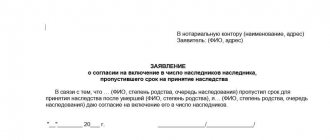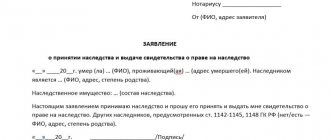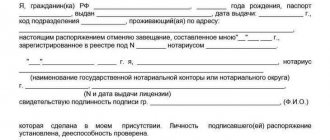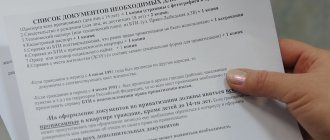“Do you want to quarrel your relatives forever? Leave them an inheritance! A joke, of course, but not without some truth.
When making a will, a person certainly wants it to serve as reliable protection for his loved ones in the future. But this does not always happen, unfortunately.
Recently, both in legislation and in judicial practice, there have been changes that clearly lead to this conclusion: obtaining an inheritance under a will is now becoming even more difficult. Let me explain what's going on:
How does inheritance occur under a will?
A person has the right to dispose of his property during his lifetime as he pleases. Including, through a written expression of will: a will. Entering into an inheritance under a will also has its own legal nuances. It is on them that we will focus our attention.
Who has the right to inherit under a will?
The will can name any relative as an heir, as well as a stranger. The principles of kinship and lines of inheritance do not apply here. Also, the following have the right to act as heirs under a will:
- Legal entities.
- International organizations.
- Foreign countries.
- RF.
- Subjects of the Russian Federation.
- Municipalities - Art. 1116 of the Civil Code of the Russian Federation.
This means that, in fact, the testator, by his will, deprives one of the relatives, several of them, or even all rights of inheritance by law, since inheritance by will has priority over inheritance by law.
Conditions for entering into inheritance
In order for an heir to inherit under a will, certain legal conditions must be met:
- Having a valid will.
- Compliance with the deadlines established by law for filing an application for acceptance of inheritance.
- There are no reasons to recognize the heir as unworthy in accordance with Art. 1117 of the Civil Code of the Russian Federation.
When one enters into an inheritance after death under a will
The general period when you can enter into an inheritance in the presence of a will is six months from the moment of death of the owner of the inherited property, i.e. the testator (Article 1154 of the Civil Code of the Russian Federation). It is during this period of time that the heirs specified in the will must contact a notary for the issuance of a certificate of inheritance.
That is, as soon as the testator has died, you can, without wasting time, immediately or after a few days contact a notary. The main thing is to do it within six months to do everything right.
If the specified deadline is missed, you will have to restore it. But this will require valid (objective) reasons for absence - Art. 1155 of the Civil Code of the Russian Federation.
Important! Even if you have a copy of the will in your hands, in which you are mentioned as the sole heir of all the testator’s property, this does not mean that it is permissible to enter into an inheritance at any convenient time. The general term applies to absolutely all heirs.
How long does it take to inherit under a will?
As we have already found out, entry into inheritance under a will occurs within 6 months from the moment the testator died. Extension of this period is not provided for by law.
You can find out about the contents of a closed will no earlier than 15 days after submitting the death certificate of the testator to the notary. After opening the envelope, the text of the will is immediately read out by the notary, about which a protocol is drawn up, where the contents of the will are entered. The original of the will remains with the notary, and the heirs are given a notarized copy of the protocol - Art. 1126 of the Civil Code of the Russian Federation.
If the heir under the will died after the opening of the inheritance, without having time to accept it within the established period, the right to accept the inheritance due to him passes to his heirs by law, and if all the inherited property was bequeathed - to his heirs by will. This is called hereditary transmission - Art. 1156 of the Civil Code of the Russian Federation.
If the remaining part of the period established for accepting the inheritance after the death of the heir is less than 3 months, it is extended to 3 months.
What to do if the deadline is missed
If the time allotted by law has expired, you will have to go to court to restore the missed period - Art. 1155 of the Civil Code of the Russian Federation. But it is not always restored.
If the heir, within six months, has performed any actions in relation to the bequeathed property, indicating its actual acceptance, he can also file an application with the court.
Condition: the applicant did not apply anywhere to fix his inheritance rights. This is done in order to recognize the actual acceptance of the inheritance and the right of ownership of such property - Art. 1153 of the Civil Code of the Russian Federation.
Actions indicating the actual acceptance of the inheritance include:
- Taking measures to protect property.
- Repair, reconstruction of residential premises.
- Payment for housing and communal services.
- Using things for their intended purpose, etc.
It is allowed to submit an application to the court to establish the fact of acceptance of the inheritance. If you want to simultaneously secure ownership of the inherited property or there are persons who challenge your rights, a lawsuit is filed.
(DOC,14 KB)
Thus, if there is a will, you can enter into an inheritance, according to general rules, within 6 months, starting from the date of death of the testator. But there are also exceptions. This applies to the inheritance of property after all deceased relatives, regardless of the order of call to inheritance.
Is it possible to refuse an inheritance under a will?
Inheritance does not always evoke pleasant associations among heirs. Especially when the testator has outstanding loans and other debts.
The heir has the right to refuse inherited property in favor of other persons - Art. 1158 of the Civil Code of the Russian Federation or without indicating in whose favor he refuses the inheritance.
Refusal of an inheritance is permissible within the period allotted for accepting the inheritance - Art. 1154 of the Civil Code of the Russian Federation, including when the inheritance has already been accepted.
If the heir has committed actions indicating the actual acceptance of the inheritance, the court has the right, at the request of this heir, to recognize him as having renounced the inheritance even after the specified period, if it considers the reason for missing the deadline to be valid.
A hereditary refusal cannot be subsequently changed or taken back.
Refusal of inheritance by a minor, incompetent or partially capable citizen is permissible only with prior agreement with the guardianship and trusteeship authority.
The heir has the opportunity to refuse the inheritance in favor of other persons from among the heirs by will or heirs by law of any order who are not deprived of the inheritance - clause 1 of Art. 1119 of the Civil Code of the Russian Federation, regardless of their calling to inherit, as well as in favor of those called to inherit by right of representation (Article 1146 of the Civil Code of the Russian Federation) or in the order of hereditary transmission under Art. 1156 of the Civil Code of the Russian Federation.
Refusal in favor of any of the following persons is unacceptable:
- From bequeathed property, if the entire estate is bequeathed to the heirs appointed by the testator.
- If an heir is assigned to an heir - Art. 1121 Civil Code of the Russian Federation.
- In favor of persons not specified in paragraph 1 of Art. 1158 of the Civil Code of the Russian Federation (they are listed above).
Also unacceptable:
- Refusal of inheritance under conditions or with reservations.
- Refusal of part of the inheritance due to the heir.
An exception is if the heir is called upon to inherit simultaneously for several reasons (by law and by will, or by way of hereditary transmission and as a result of the opening of an inheritance, etc.).
Then he has the right to refuse the inheritance due to him on one of the mentioned grounds, on several of them, or on all grounds.
Refusal of an inheritance is made by submitting an application from the heir to a notary at the place of opening of the inheritance to a notary or authorized in accordance with the law to issue certificates of the right to inheritance to an official - Art. 1159 of the Civil Code of the Russian Federation.
When an application for refusal is submitted to the notary not by the heir himself, but by someone else, or sent by mail, the heir’s signature on this application is certified by a notary or other authorized person.
The assistance of a representative is possible if the power of attorney specifically provides for the power to refuse. A power of attorney is not required for a legal representative.
The legatee (the person in whose favor the legacy is made) has the right to refuse to receive it - Art. 1160 of the Civil Code of the Russian Federation. But it is impossible to do this in favor of another person, to refuse with reservations or under conditions.
When the legatee acts as an heir at the same time, his right to refuse a testamentary refusal does not depend on the right to accept or refuse an inheritance.
The testator has the right in his will to impose on one or more heirs by will or by law the obligation to carry out something - Art. 1139 of the Civil Code of the Russian Federation.
For example, actions of a property or non-property nature aimed at achieving a socially useful goal.
An identical obligation is sometimes assigned to the executor of a will, provided that a portion of the inherited property is allocated in the will for the execution of the testamentary assignment.
Interested persons, the executor of the will and any of the heirs have the right to demand the execution of the testamentary assignment through the court, unless the will provides otherwise.
Right to refuse inheritance
Only the heir himself decides whether to accept the inheritance or not. The heir's right to refuse the inheritance can be exercised within six months from the date of opening of the inheritance. The renunciation of inheritance cannot be subsequently changed or taken back. Refusal most often occurs if the debts of the testator significantly exceed the value of the inherited property.
Important: Refusal of part of the inheritance due to the heir is not allowed. You can refuse the entire inheritance.
How to enter into an inheritance according to a will - step by step
Entering into inheritance under a will has certain legal conditions. Each potential heir must familiarize himself with them in advance.
How to open an inheritance under a will - step one
The inheritance opens automatically at the time of the death of the testator - Art. 1113 of the Civil Code of the Russian Federation. No additional actions are required from the heirs for this.
If a person is declared dead by a court, the moment of death is considered to be the entry into force of the relevant court decision or the date of death indicated in the decision.
The legal condition for the recognition of inheritance rights under a will is the existence of the will itself.
How to find out that you are an heir - step two
Most often, people learn about a will by sorting through the papers of the deceased. Another option is to inform relatives about this.
If the original will is not found and none of the relatives knows about its existence, then citizens often find out about its existence after filing an application to accept the inheritance by law.
The notary checks the notary register and, seeing information about the will in it, informs the heirs about this.
How to find out about the contents of a will - step three
The contents of the will, in the case of an open form, can be familiarized by studying the original of its second copy. It remains in the hands of the testator. If the original is not found, then the above algorithm is applied.
If there is a closed form of will, the testator will keep a document indicating that the notary has accepted the closed will - Art. 1126 of the Civil Code of the Russian Federation.
It will be called “Certificate of Acceptance of a Closed Will.” It also displays the place where the notarial act was performed, full name, job description of the notary (notary office).
After the death of the testator (relative or other person), you will need to find this document in order to find out which notary has the original will and to enter into inheritance rights without any problems.
How to find a will - step four
First of all, you need to carefully review all the papers of the deceased. The original will (second copy) will certainly be kept by the testator.
If for some reason it is not found, then you should contact the notary at the place where the inheritance was opened. The latter will help you find the will, if there is one.
From the register, the notary will receive information about the date and place of certification of the will, and the official who certified it. He will provide this information to you. If you have such information, you can easily find the notary you need and contact him to issue a duplicate.
The notary who keeps the first copy of the will is not obliged to search for the heirs.
According to Art. 61 “Fundamentals of the legislation of the Russian Federation on notaries”, the notary in charge of the inheritance case is obliged to notify about this those heirs whose place of residence or work is known to him.
The notary also has the right to summon the heirs by posting a public notice or reporting this in the media.
As for the will itself, in accordance with Art. 60.1 “Fundamentals of the legislation of the Russian Federation on notaries” no later than 1 business day following the day of opening of the inheritance case, the notary in charge of this case is obliged to check in the notary's Unified Information System the availability of information about the preparation of a will by the testator and establish its contents.
The notary establishes the contents of the will on the basis of an electronic image of this will entered into the register of notarial actions of the notary's UIS. On the same site, heirs can independently search for inheritance cases.
Where to go with a will after the death of the testator - step five
An important point: what you need and where to go to enter into an inheritance.
With the copy of the will you have, you should first go to the notary who certified the will. The details of such an official are indicated in the will itself.
If the address is not among them, then you can find the location of the notary via the Internet, including by visiting the website of the regional notary chamber of the subject of the Russian Federation where the will was certified.
Another option is to find out the address from any nearest notary. He has access to a single notary database. And finally: telephone help services are still working. There are also telephone directories in electronic and paper format.
If the notary who certified the will is no longer working, then you need to go to the notary who keeps his archive. To find out who exactly is storing it, use the algorithm presented above.
These officials check whether the will has been canceled or changed. If everything is in order, then they put a corresponding mark on the will you have with you.
After making such a mark, they turn to the notary at the last place of residence of the testator - Art. 1153 of the Civil Code of the Russian Federation. If this is unknown, then at the location of the real estate included in the inheritance.
It also happens that at the time of application, the inheritance case has already been opened by another notary. Having checked the database and recorded this fact, the notary will tell you about this and provide information about the notary who is handling the inheritance case you need.
What do you need from the documents - step six
Registration of inheritance consists, first of all, in filing an application. They go to a notary with an application for acceptance of an inheritance or with an application for the issuance of a certificate of right to inheritance. It is drawn up in advance or directly at the notary’s office.
Sample application (DOC, 14 KB)
The following documentation is attached to the application:
- Death certificate (original).
- A will with a note (from the notary who certified the will, or who keeps the archive) stating that the will has not been canceled or changed (original).
- Documents (originals) confirming your identity.
- Documents confirming the residence of the testator in the territory of the municipality on the day of death.
- A certificate of the last known place of residence of the deceased (registration at the place of residence) in the territory of the municipality at the place of application on the day of death.
- An extract from the house register from the last permanent place of residence of the deceased.
- A copy of the financial and personal account (owner registration card, single housing document) from the last permanent place of residence of the deceased.
If the application is not submitted to the notary by the heir himself or he sends it by mail, the signature of the latter is certified by a notary. This is also done:
- An official authorized to perform notarial acts - clause 7 of Art. 1125 of the Civil Code of the Russian Federation.
- The person authorized to certify powers of attorney in accordance with clause 3 of Art. 185.1 of the Civil Code of the Russian Federation.
In this case, it is also possible to receive a certificate of inheritance right to the house (by mail). This should be mentioned in the text of the statement.
What is the procedure for receiving an inheritance under a will?
All legally formalized legal relations and procedures have a certain algorithm. Inheritance under a will is no exception.
How to register an inheritance under a will
The main algorithm for entering into an inheritance comes down to two large acts.
Step 1. Prepare documents.
Step 2. We take legally significant actions.
List of minimum necessary actions for entering into inheritance under a will:
- If you have a copy of the will, contact the notary who certified it.
- Check the will for cancellations/changes and mark that there were none.
- With an application for acceptance of the inheritance and the attached documents, contact the notary at the place where the inheritance was opened.
- Pay the state fee.
- Obtain a certificate of inheritance.
Additional measures: if the heir does not have the original will (second copy), then he has the right to contact any notary in order to check the availability of the original (first copy) from one of the notaries. This is done through the Unified Notary Register.
After discovering the original in the system, the heir will have the opportunity to contact the notary with whom it is stored to issue a duplicate.
Important! A certificate of the right to inheritance is issued after 6 months from the date when the testator died. This is done so that all heirs have time to apply for inheritance.
The procedure for entering into inheritance rights will be the same when registering an inheritance for a house, apartment and other property of the testator.
How much should I pay the state duty?
The amount of the state duty collected for issuing a certificate of the right to inheritance under a will depends on the category of heirs (degree of relationship):
- Children, including adopted children, spouse, parents, not half-sisters/brothers of the testator - 0.3% of the value of the inherited property, but not more than 100 thousand rubles.
- Other heirs - 0.6% of the value of the inherited property, but not more than 1 million rubles.
This is expressly stated in Art. 333.24 Tax Code of the Russian Federation. This article applies subject to the provisions of art. 333.25 Tax Code of the Russian Federation. For example: the value of inherited property is assessed based on its value on the day the inheritance is opened. The assessment may be carried out, inter alia, with the assistance of specialists: appraisers.
Payment of the state duty is carried out after the distribution of property and before receiving a notarial certificate for the re-registration of property rights.
A number of heirs have benefits in paying state duty - Art. 333.38 Tax Code of the Russian Federation:
- Disabled people of groups 1-2 - 50%.
- Individuals - for issuing certificates of the right to inheritance during inheritance - housing, land plot with a house, if they lived together with the testator on the day of his death and continue to live in this housing after his death - 100%.
- Individuals - for issuing similar certificates for the property of persons who died in connection with the performance of public or state duties or with the fulfillment of the duty of a citizen of the Russian Federation to save human life, protect state property and law and order, as well as the property of politically repressed persons - 100%.
- Individuals - for identical notarial actions in relation to bank deposits, funds in bank accounts of individuals, insurance amounts under personal and property insurance contracts, amounts of wages, copyrights and amounts of royalties, pensions - 100%.
- Minors - 100%.
- Mentally ill citizens under guardianship - 100%.
What to do after registering an inheritance
The issuance of a certificate of inheritance by a notary already confirms the ownership of the property inherited under the will. However, for some transactions this is not enough. In particular, for the purchase and sale of real estate. Especially when it comes to shared ownership.
The most important thing that should not be forgotten is the registration of the right to inherited real estate. This is done through Rosreestr (Federal Service for State Registration, Cadastre and Cartography). Without registering real estate, it will be impossible to carry out transactions with it.
A state fee is also charged for registering the right to real estate. Its amount for general registration of rights is 2 thousand rubles.
All other property does not need to be registered and the heirs have the right to dispose of it from the moment they receive the certificate. The exception is TS. It must be re-registered to the new owner with the State Traffic Safety Inspectorate within 10 days from the date of receipt of the certificate of inheritance. It is possible to carry out the procedure online through the government services portal.
Self-propelled vehicles are registered with Gostekhnadzor.
What problems arise with a will?
A will, being a unilateral transaction, accordingly, has legal grounds for challenging and invalidating it.
This means that the interested party has the right to challenge the will in court (if there are grounds for doing so) or the will will turn out to be void (invalid by law or for other reasons listed in the Civil Code of the Russian Federation).
In the latter case, a court decision is not required.
The legal consequence of declaring a will invalid is its complete cancellation. Then the norms of the Civil Code of the Russian Federation on inheritance by law will be applied.
The heir also runs the risk of being declared unworthy - Art. 1117 of the Civil Code of the Russian Federation.
Do not inherit by will:
- Persons who deliberately committed illegal actions directed against the testator, his heirs or against the implementation of his last will, contributed to or attempted to call themselves or other persons to inherit.
- Citizens who contributed or tried to increase the share of the inheritance due to them or other persons.
These circumstances are confirmed in court. Only under this condition will the heir be unworthy.
If, after the loss of the right of inheritance by the heir, the testator nevertheless bequeathed his property to a potentially “unworthy heir,” then the latter has the right to inherit this property.
The next pitfall is the obligatory share in the inheritance - Art. 1149 of the Civil Code of the Russian Federation. If the testator has minor/disabled children, disabled parents, a spouse, and dependents, then they inherit, regardless of the contents of the will, at least ½ of the share due to each of them upon inheritance by law.
An unpleasant surprise for the heir will also be a testamentary assignment in the form of an obligation to maintain the testator’s pets and to carry out some socially useful mission.
Well, and, of course, we should not forget that in addition to property, the testator often has debt to banks, managers, resource supply companies, the Federal Tax Service, etc. Creditors have the right to seek debt collection through the court by seizing and selling inherited property.
Nuances
When inheriting under a will, it is important to take into account some features that influence the composition and use of the inheritance mass.
Mandatory share
The will of the testator is not unlimited. It is within the framework of legislation that does not allow deprivation of the inheritance property of the needy relatives of the deceased. And, if the testator himself refused to receive the inheritance or gave them too little, in any case they will have at their disposal an obligatory share - half of what they were entitled to without a will, according to the law.
The legal holders of the compulsory share can be:
- Disabled parents, children and spouse of the deceased.
- Dependents who have been in his care for at least a year.
The allocation of the obligatory share is made from the untested part of the property, but if it is not enough, what has been assigned to the other heirs will have to be cut back.
Testamentary refusal
The testator has a unique opportunity to attach an obligation to substantive law, thus predetermining the further use of certain objects.
Under the guise of a testamentary refusal, you can:
- Give the right person the right to live in the living space bequeathed to another person for a certain period or for life.
- Give the legatee a specific item for temporary or permanent use.
- Oblige the executor or heir to pay maintenance to the legatee in the specified amount and frequency.
- Demand the performance of another property service in favor of the legatee.
The designated legatee can be assigned another if the first one does not want to accept the service or dies before the testator.
Laying on
Testamentary assignment is another type of obligation that burdens the receipt of material benefits. As part of the assignment, the responsible persons (executor, successors), at the expense of the inherited property, will be required to perform a service of a property or non-property nature, aimed at achieving a generally beneficial goal.
An example of a testamentary assignment would be: caring for a pet, garden, house, restoration of an object of general cultural or family value, etc.
How to receive an inheritance under a will in the Russian Federation for a foreigner
If the heir indicated in the will lives outside the Russian Federation, then he has the right to contact the notary in person, through his representative, or send documents by mail. In the last two cases, the applicant’s signature must be certified. There are no obstacles to inheritance by will by foreigners in Russia.
What are the conditions for a foreigner to inherit an inheritance under a will?
The legal condition for a foreign citizen to enter into an inheritance under a will in the Russian Federation is the direct designation of him as an heir by the Russian testator. In this case, there are no differences in the procedures for entering into inheritance for citizens of the Russian Federation and foreigners.
What will be the algorithm of actions
- If you have a will in your hands, make a note that it has not been canceled or edited.
- Send an application for acceptance of the inheritance with the relevant documents to the notary at the place where the inheritance was opened.
- Pay the state fee.
- Obtain a certificate of inheritance.
Division of property between heirs
If the testator assigned his property to several heirs without indicating shares, then it is divided equally between them.
The procedure for using indivisible property is determined:
- By verbal agreement between the beneficiaries.
- By written agreement between the heirs (Article 1165 of the Civil Code of the Russian Federation). The document will allow not only to determine the procedure for using the property, but also to redistribute the property. For example, to allocate a share in the interests of a co-owner while simultaneously compensating its value to the current owner.
Crib
Once again, we will briefly outline the procedure for entering into inheritance rights in the presence of a will:
- We find the original copy of the will, which was in the hands of the testator. If it is not there or it is damaged, we contact the notary who previously certified this will (if not, the one who keeps the archive) in order to obtain a duplicate.
- On the original (duplicate) we put a mark that the will has not been canceled or edited.
- We contact the notary at the place where the inheritance was opened with an application for acceptance of the inheritance (issuance of a certificate of the right to inheritance) and attach the necessary documents to it.
- We receive a certificate of inheritance.
- If there is real estate in the estate, we register it in Rosreestr, the vehicle in the State Traffic Safety Inspectorate, and self-propelled equipment in Gostekhnadzor.
What was left to you as an inheritance and is it difficult to obtain?
After 6 months
Art. 1155 of the Civil Code allows the testator to enter into the property rights even after the established period if there are good reasons that prevent the timely acceptance of the inheritance. This may be ignorance of the death of the testator or failure to carry out the actions necessary to establish the fact of acceptance of the property.
To rectify the situation, the written consent of other heirs or going to court will be required. It is important to remember that the time frame for such actions is also limited and amounts to 6 months from the moment the reasons for absence disappear.






